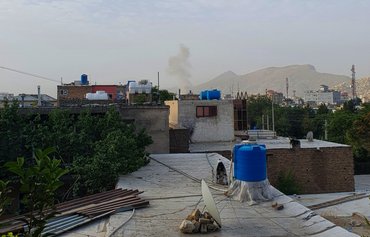ADEN -- The killing of al-Qaeda leader Ayman al-Zawahiri is a security success that will boost stability in Yemen and strike a severe blow to the extremist group and its supporters across the world, analysts in Yemen said.
Al-Zawahiri, one of the world's most wanted terrorists, was killed in a high-precision US drone strike on July 31 as he stepped onto the balcony of his "safe house" in the Afghan capital of Kabul.
In a televised address on August 1, US President Joe Biden revealed that the United States had been monitoring al-Zawahiri's movements for months.
Before the smoke from the two Hellfire missiles fired at al-Zawahiri cleared, international speculation had focused on his potential successor -- a selection fraught with potential rivalries that may further weaken the group.
![A picture taken with a mobile phone on May 24, 2014, shows al-Qaeda militants posing with the group's flag in Seiyun, Hadramaut province, Yemen, after an assault that killed at least 15 soldiers and police. [AFP Photo/STR]](/cnmi_am/images/2022/08/08/36569-AQ-fighters-Yemen-600_384.jpg)
A picture taken with a mobile phone on May 24, 2014, shows al-Qaeda militants posing with the group's flag in Seiyun, Hadramaut province, Yemen, after an assault that killed at least 15 soldiers and police. [AFP Photo/STR]
![This image taken from video and released by the IntelCenter, a terrorism database, shows al-Qaeda leader Ayman al-Zawahiri making a statement. According to the IntelCenter, al-Qaeda's as-Sahab Media released the video July 4, 2007. [IntelCenter/AFP]](/cnmi_am/images/2022/08/08/36571-Ayman-al-Zawahiri-600_384.jpg)
This image taken from video and released by the IntelCenter, a terrorism database, shows al-Qaeda leader Ayman al-Zawahiri making a statement. According to the IntelCenter, al-Qaeda's as-Sahab Media released the video July 4, 2007. [IntelCenter/AFP]
In reports published ahead of al-Zawahiri's death, a United Nations (UN) monitoring team and the International Centre for Counter-Terrorism (ICCT) set out lists of potential successors.
Both pointed to Saif al-Adel, an Egyptian, as the likeliest to succeed al-Zawahiri but floated a number of other names that may be under consideration.
Among them are Moroccan-born Abdal Rahman al-Maghrebi, Algerian national Abu Ubaydah Yusuf al-Anabi (Yazid Mebrak), the leader of al-Qaeda in the Islamic Maghreb (AQIM); and Somali national Ahmed Diriye (Ahmed Umar and Abu Ubaidah), the leader of al-Shabaab, an al-Qaeda affiliate based in Somalia.
Commenting on the UN team's report, the Soufan Centre think-tank noted that "no leaders from al-Qaeda's Yemeni franchise, al-Qaeda in the Arabian Peninsula (AQAP)" appear on the list of potential successors to al-Zawahiri.
It appears that AQAP has been "demoted from first-tier status", it said.
No Yemeni contenders
In an April 2015 Brookings Institution report, AQAP is described as the "al-Qaeda affiliate with the closest relationship to al-Qaeda leader Ayman al-Zawahiri" -- a branch at "the core of the al-Qaeda organisation".
So what happened?
While the war in Yemen provided fertile ground for groups like al-Qaeda to regain a foothold, the emergence of the rival "Islamic State of Iraq and Syria" (ISIS) splintered extremist loyalties, weakening both, analysts said.
At the same time, AQAP's focus has become increasingly parochial, even as the group's franchises in Africa gain increased prominence.
The decentralisation of al-Qaeda's management started at the end of the Osama bin Laden era and became a permanent state of affairs, said researcher Saeed al-Jamahi, who specialises in the affairs of extremist groups.
"Al-Zawahiri's killing will not have a major or profound impact within the group because al-Zawahiri had lost control and influence over the group's nodes," he said.
Al-Qaeda is acting "according to mechanisms imposed by the reality of each branch of the group", he said, adding that it is unlikely that a new global leader for the group will emerge from the AQAP branch.
Like other analysts, he identifies al-Adel as the likeliest al-Zawahiri successor.
"No remaining Yemeni leaders have the charisma and leadership qualities required, qualities that are scarce in the group in general, and in Yemen in particular," he said.
'Weakened state'
"Al-Qaeda is now in its weakest state since the killing of Osama bin Laden, and it will become even weaker after the killing of al-Zawahiri," said Abdul Salam Mohammed, director of the Abaad Centre for Strategic Studies.
One of the reasons is that some of its leaders and members joined rival extremist groups, including ISIS, he said.
Another reason for the group's shrinkage is that it "no longer possesses an incubating environment, except in areas of chaos and war", Mohammed said.
However, al-Qaeda "has found a suitable environment for growth in the areas where Iran has a presence", he said.
"Despite the ideological clash between Iran and al-Qaeda, the former has opened its arms in the areas under its control or under the control of its militias to some of the group's leaders," Mohammed said.
Iran is helping al-Qaeda by "harbouring some of its leaders, and international reports indicated that the Houthis released dozens of the group's leaders in exchange for military training operations", he said.
"This is evidence of co-ordination" between the two sides, he said.
He pointed out that al-Qaeda "consists of cells that are ideologically but not structurally linked".
"Therefore, the killing of leaders does not have a significant impact, because the ties to leaders are ideological," he said, with attacks that serve this ideology, rather than being commanded by one man.
"The terrorist ideology will not die with the death of al-Zawahiri, as it can hop from one environment to another," he said.

![Suspected al-Qaeda militants stand behind bars during a hearing at the appeals court on November 25, 2014, in Sanaa. [Mohammed Huwais/AFP]](/cnmi_am/images/2022/08/08/36570-AQ-militants-trial-600_384.jpg)






